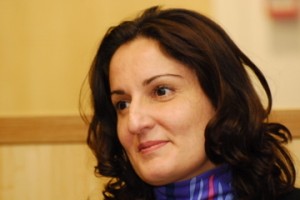“Austerity measures calm markets but don’t give hope to families” and so “ a ‘New Deal’ should be launched involving a few key sectors that are able to get the EU economy moving again”. Anna Maria Darmanin has a clear  picture of the crisis and his effects on European population. She is the Maltese Vice-President of the European Economic and Social Committee (EESC), a consultative body of the EU that enable civil society organisations from the Member States to express their views at European level. She is worried about the message that the protests that are going on in Grece, Spain and Portugal are sending to the EU institutions.
picture of the crisis and his effects on European population. She is the Maltese Vice-President of the European Economic and Social Committee (EESC), a consultative body of the EU that enable civil society organisations from the Member States to express their views at European level. She is worried about the message that the protests that are going on in Grece, Spain and Portugal are sending to the EU institutions.
Do you think that the protest will spread to other countries?
“Maybe. I understand why they demonstrate. While billion-euro bailouts have been spent on rescuing the organisations that are responsible for the crisis, people in the worst affected countries are left to fend for themselves. Too many workers have lost their jobs and cannot find others. People are forced to accept lower wages or their security benefits have been slashed or withdrawn. They are desperate.”
The Fiscal Compact is the measure that Trade Unions are criticizing the most. What is your point of view on the Stability Pact?
“The Fiscal Compact suffers from an extensive “democratic deficit” in by-passing the European Parliament and other Union institutions. The EESC considers that the economic policies currently being pursued in the EU (austerity, budget restraint at national level, limiting the EU budget, etc.) are initiating a recessionary process with unpredictable effects at a time when what is needed is the opposite, i.e. steps to support growth and jobs with a more courageous, effective proposal.”
What the Commission is doing for growth and jobs?
“In April 2012, the European Commission launched a new bid to reverse this alarming trend, through a ‘job-rich recovery’, recommending a series of measures including cutting the tax burden on labour, offering hiring subsidies for firms, and boosting lifelong learning. It also called for decent wage rates, better-quality jobs, and tough action to combat undeclared work. The Committee welcomes this programme but also finds it long overdue. And the measures proposed are sadly not in proportion to the rising unemployment levels and the attendant lack of prospects – especially for many young people.”
Which measures do you suggest?
“A significant contribution could come from the Structural Funds and in part, on a temporary basis, from those of the CAP(Common agricultural policy).”
Usually Structural funds are misused by Regions. Don’t you think EU should use that money in a different way?
“We should boost cooperation and competence building. The technicians of the most virtuous regions could help regions facing difficulties. But we have to say that there is a lot of red tape in Structural funds, and this doesn’t hel regions. Commission should be more flexible.”
What should be the priorities for the future to face the crisis without asking sacrifices?
“A European plan for growth – a ‘New Deal’ – should be launched, with large, targeted projects, involving a few key sectors that are able to get the EU economy moving again. For example information and communications technology (ICT) and health. Such a plan could be financed by using, with immediate effect, residual funds from 2007-2013, to which part of those planned for 2014-2020 could be added for a limited time.”
What other revenue could the EU use?
“This plan should be supported and boosted also by the issue of two distinct types of European bonds: untraded bonds to stabilise debt (composed of converted national debt of up to 60% of GDP) and traded bonds to stimulate growth by attracting capital from outside the EU and co-financing EIB investment projects.”
Alfonso Bianchi
To lern more:
– The European Economic and Social Committee website http://www.eesc.europa.eu/?i=portal.en.home
– Anna Maria Darmanini’s blog http://www.eesc.europa.eu/?i=portal.en.vice-president-communication-amd-blog



![Una donna controlla le informazioni sul cibo specificate sulla confezione [foto: archivio]](https://www.eunews.it/wp-content/uploads/2014/12/Etichette-alimentari.jpg)


![Ragazza in biblioteca. Nell'Ue chi studia non lavora e neppure cerca. In Italia funziona ancor più così [foto: Tulane University, Wikimedia Commons]](https://www.eunews.it/wp-content/uploads/2024/11/Girl_in_the_Library_3638661587-350x250.jpg)



